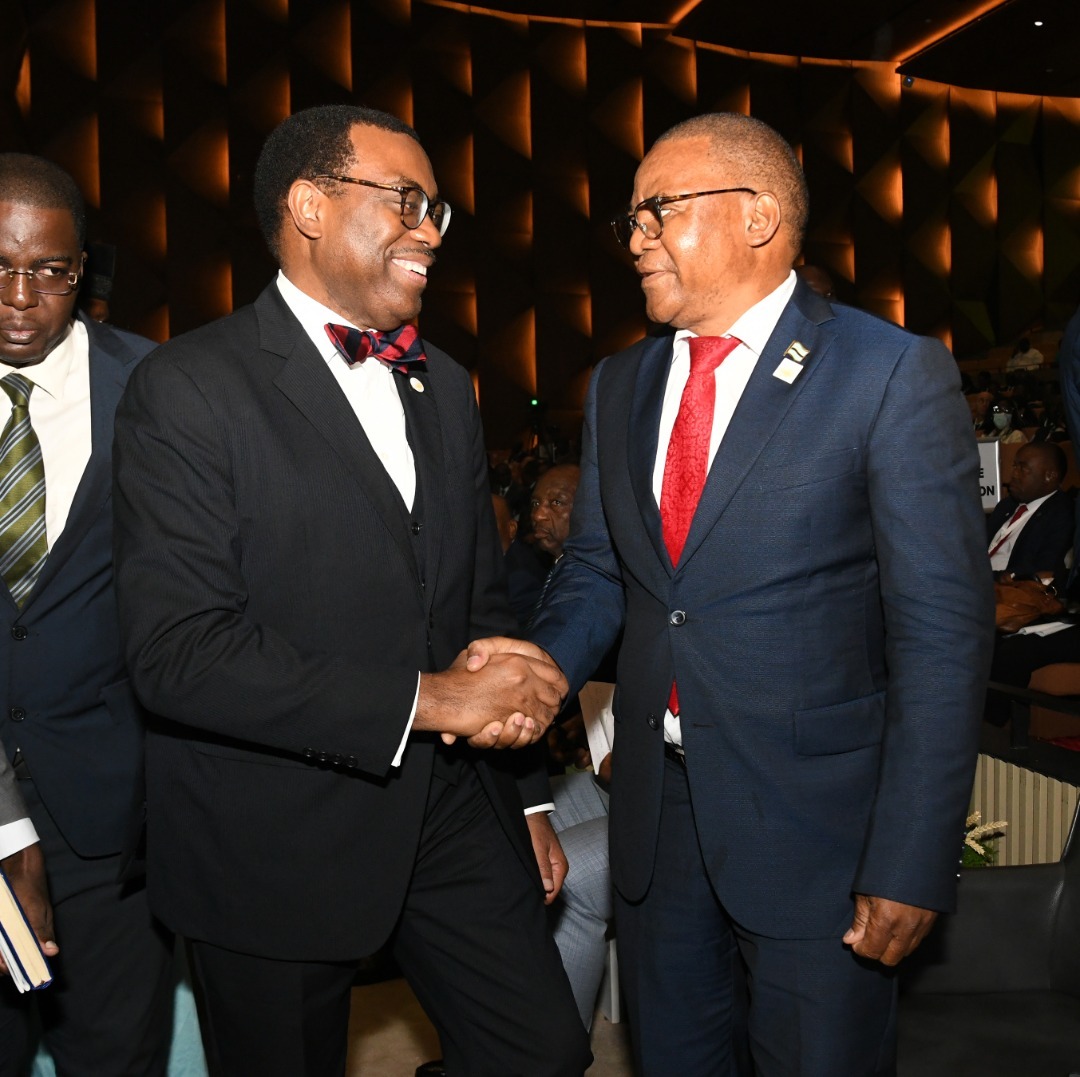By Baboloki Semele
Dakar, Senegal: The government of Botswana secured a deal from the African Development Bank to develop a special agro-processing industrial zone for beef. This was revealed by the president of the African Development Bank Dr. Akwinumi Adesina, on the margins of the second Dakar Summit on feed Africa, in Senegal last week.
Adesina highlighted that Botswana as an exemplary African Union Member State has done tremendously well in equal resource distribution, especially using beef to develop the livelihoods of the citizens.
He said prior to the plenary, he met with the Botswana head of delegation at the Dakar Second Summit on Feed Africa, Vice president Slumber Tsogwane, to discuss and agree that the African Development Bank will support the landlocked Southern African country in the development of a special agro-processing industrial zone for beef.
The number one in command AfDB diplomat noted that special agro-processing industrial zones have a high potential to yield results of Africa feeding herself as well as helping develop rural areas.
“We are investing in special agro-processing industrial zones in the North, in the center, and in the South. These special agro-processing industrial zones are going to change the density of infrastructure in the rural areas around agriculture; power, water, roads, irrigation, storage, logistics, and this will make agricultural processing a value addition and profitable,” said Adesina.
He noted that as services will be closer to where food is produced, there will be limited or non-movement of raw materials but finished products from one place to another, ultimately creating more jobs and contributing largely to the reduction of rural-to-urban migration.
According to reliable information provided by the Botswana Meat Commission (BMC), Botswana has around 2.5 million cattle, and 10% of these are available per year. BMC has the capacity to slaughter 200,000 a year, and so is focused on niche markets as it cannot compete on economies of scale with markets like Brazil.
To be competitive globally, BMC says there is a need to guarantee the quality, consistency, and regularity of Botswana meat supplies, which means the need to upgrade quality production. To achieve this goal, BMC has implemented international standards for its meat, including ISO 9001, Halal certification, and the British Retail Consortium Standard, and for 3 years since 2016, BMC has been rated a grade-A facility, which makes it one of the few facilities to have that rating in the world.
In his submission during the plenary, on behalf of the Botswana delegation, which comprised three additional Ministers of Agriculture, Presidency and Entrepreneurship, Tsogwane appreciated the governments of Namibia and South Africa, who availed their ports for the country to use in accessing international markets for Botswana beef and other products.
Tsogwane highlighted that at independence, the contribution of agriculture to Botswana’s GDP was 40%, and has swiftly declined to only 2%, overtaken by other industries such as the diamond industry, and is now challenged to diversify from the diamond economy to feed herself.
“One of the challenges Botswana is facing in the agriculture space is that farmers are struggling to put up desalination plants. Even in the villages, we have a problem because of the saline water.”
He seized the opportunity to inform the audience that Botswana approached Lesotho to negotiate the transfer of water from Lesotho to Botswana.
The concern, of this publication, was that infrastructure development is mostly concentrated in urban areas, whereas farming takes place in rural and remote areas, and at times, farmers are unable to access their farms or even markets in urban areas, in cases of extreme weather events, inhibiting travelling due to swelling rivers and muddy roads.
In response to this, and in agreement, Dr. Adesina noted that Africa has a deficit of infrastructure of 68 Billion USD to 108 Billion USD per year, but the African Development Bank has for the past four years invested 44 Billion USD towards infrastructure development, in a bid to curb the deficit.
He made a mention of the Kazungula bridge, A PIDA project, which is located at the corner of four African countries, Botswana, Namibia, Zambia, and Zimbabwe, also at the epic center of the North-South Corridor.
Until a year ago, crossing the Zambezi River between Botswana and Zambia was a slow and congested affair. For trucks moving along a key transport corridor, stretching from Lubumbashi in the Democratic Republic of Congo (DRC) to Durban, South Africa, the river was an obstacle without an elegant solution. Vehicles would load onto a pontoon, two at a time, when the current wasn’t too strong and the rains not too heavy. It was a 10 to the 15-minute journey that you could spend up to 15 days waiting for.
Today, the pontoons sit ashore, mercifully redundant. One might spot them while crossing the 923-meter (3,028-foot) long Kazungula Bridge, a $260 million project co-financed by Botswana, Zambia, and the African Development Bank, that a year into service has already transformed this southern African trade artery.
Copper from DRC, Zambia, and Tanzania traveling south before being shipped to China. Food from South Africa traveling north. Mining equipment from Tanzania heading to the DRC and Zambia. All pass across Kazungula. This is an example of how critical infrastructure development is to other sectors of the economy, including the ambition of Africa to feed itself.
